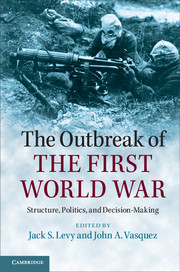Book contents
- Frontmatter
- Dedication
- Contents
- List of figures
- List of tables
- List of contributors
- Preface
- Part I Overview of debates about the causes of the First World War
- 1 Introduction
- 2 July 1914 revisited and revised
- Part II Structure and agency
- Part III The question of preventive war
- Part IV The role of the other powers
- References
- Index
- References
1 - Introduction
Historians, political scientists, and the causes of the First World War
Published online by Cambridge University Press: 05 July 2014
- Frontmatter
- Dedication
- Contents
- List of figures
- List of tables
- List of contributors
- Preface
- Part I Overview of debates about the causes of the First World War
- 1 Introduction
- 2 July 1914 revisited and revised
- Part II Structure and agency
- Part III The question of preventive war
- Part IV The role of the other powers
- References
- Index
- References
Summary
Overview
It has been 100 years since the Great War, as it was called at the time, scorched the earth and psyches of the West, transforming our lives and world forever. As George Kennan remarked, the First World War was “the great seminal catastrophe” of the twentieth century. The war destroyed empires and it led to political and social upheavals across Europe, the emergence of new national states, and a redrawing of the map of the Continent. It set the stage for the rise of Hitler and the Second World War and, indirectly, for the Cold War. It also triggered a significant shift in attitudes toward war, from one in which war was seen as acceptable and natural to one in which war was seen as abhorrent, if not irrational, and to be avoided. In military terms, the First World War also marked a shift away from the limited wars of the mid-nineteenth century to total war with extensive social mobilization. The experiences of the war also produced a substantial body of work in literature and film that continues to shape images of war generations later. The impact of the war was all the greater because it became a political and emotional issue after the inclusion of the war guilt clause in the Versailles Treaty.
Historians have now debated the origins of the First World War for a century. These debates have been motivated in part by the complexity of the processes leading to the war, and by the fact that the war provides some evidence to support a large number of different interpretations. As Paul Kennedy remarked, “the First World War offers so much data that conclusions can be drawn from it to suit any a priori hypothesis which contemporary strategists wish to advance.” Those clinging to a version of the “slide to war” hypothesis have been further motivated by the gap between what they regard as the relatively limited aims of most of the participants, and the enormity of the destruction of the war and of its political and social consequences. Many others have been motivated by the politicized nature of interpretations of the war, affecting conceptions of national identity and having implications for government policies years later.
- Type
- Chapter
- Information
- The Outbreak of the First World WarStructure, Politics, and Decision-Making, pp. 3 - 29Publisher: Cambridge University PressPrint publication year: 2014
References
- 2
- Cited by



